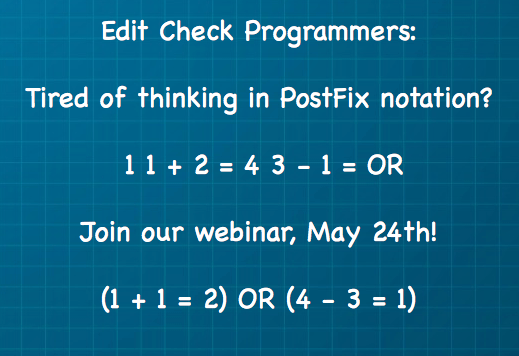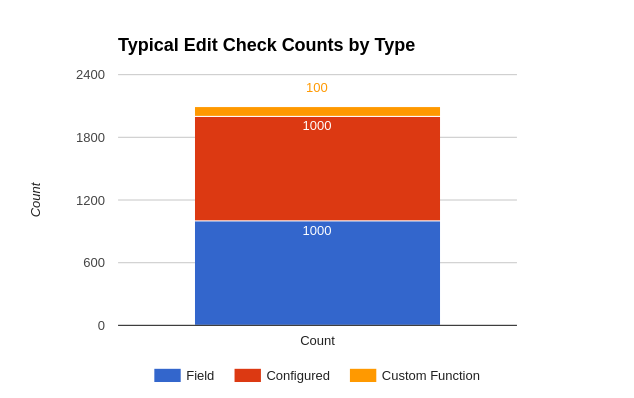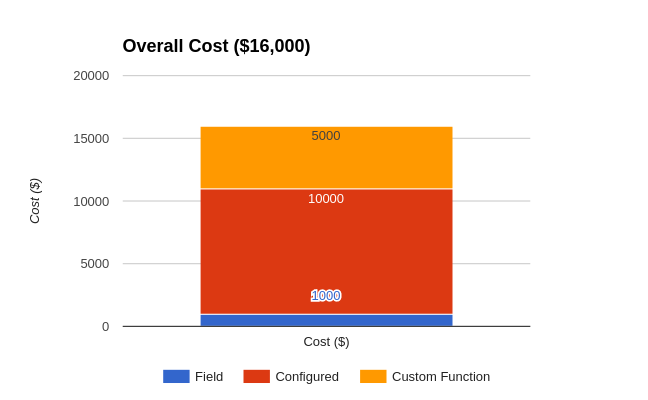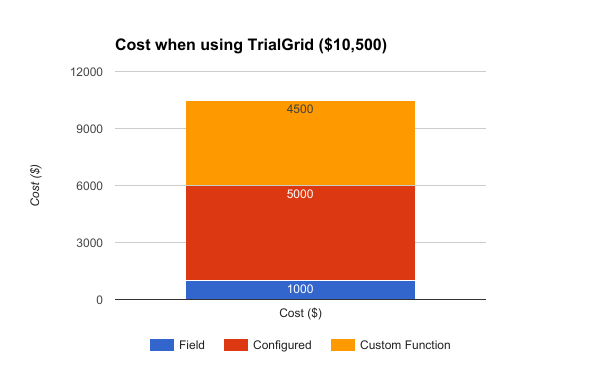Anyone who participates in endurance sports such as cycling or running
will have heard of The Wall. It is the point at which the athlete
exhausts their glycogen stores, resulting in a feeling of fatigue,
the inability to go on.
As a Data Manager in a Study Builder role the chances are that you
have experienced something similar, the point at which the logic for
an edit check becomes too complex and you have to fall back on a
Custom Function. This is the Edit Check complexity "Wall."
Three levels of Edit Check logic
Essentially Rave has three levels of edit check logic:
- Field Checks (Range, IsRequired, QueryFutureDate etc)
- Configured Checks (Rave Edit Checks)
- Custom Functions
Field Checks can be set up with a few clicks and some data entry for
expected high and low ranges. They are extremely fast and easy to
set up and require little or no testing since they are features of the
validated Rave system.
Configured Checks are written using Rave's Edit Check editor which uses
a postfix notation (1 1 + 2 isequalto). Rave Edit Checks are flexible
and very functional but every Edit Check that is written has to be
specified, written and tested making it an order of magnitude more
expensive to create than a Field Check. The learning curve for
Configured Checks is quite steep since most of us were taught infix
notation in school (1 + 1 == 2).
Lastly we have Custom Functions. These are written in C#, VB.NET or
SQL and require some level of true programming expertise. Custom
Functions are the fallback, the special tool in the toolbox for the
truly complex situations. Besides the
difficulty of hiring (and keeping) good programmers in the current
technical market, Custom Functions have to be specified, reviewed for
coding standards and performance impact as well as tested. Because of
the level of skill required we want to write as few Custom Functions
as possible.
Costs and learning curves
A graph of the learning curves for the different Edit Check logic types
might look like this:
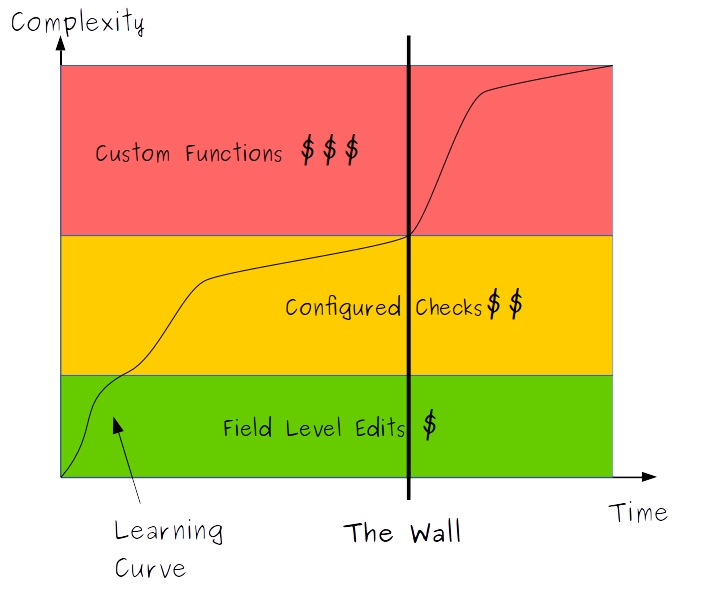
As we can see from the image, Field Checks have a very fast learning
curve but they don't get you to a very high level of complexity.
Learning Configured checks can be done quite quickly for the basics but
mastery takes longer and eventually you reach the Wall where the
complexity of a specified check means that you will need to use a
Custom Function. We are all familiar with the most simple Custom Function:
But doing anything more complicated takes technical training.
Mitigation
The Wall represents the transition from Configured Checks to those
requiring Custom Functions. We know that writing Custom Functions is
expensive so we want to reduce reliance on them and so move the Wall
further away. Some strategies which can be used to do this are:
-
Have standard/parameterized Custom Functions. For instance, instead
of writing a custom function to compare specific date and time values, create a parameterized function which can be
used for any date and time comparisons. These types of standard functions don't need the same level of validation
as a bespoke Custom Function.
-
Analyse the Edit Checks you have written in the past and the queries
that they generated. Research on Edit Check complexity
in Medidata Rave studies found that the most complex edit checks were the ones least likely
to fire. If an Edit Check requires logic so complex
that it requires
a bespoke Custom Function you may be better off using a manual listing
or running the Edit Check as part of other back-end checks.
What we are doing
At TrialGrid we're attacking this challenge with CQL, our Clinical
Query Language. CQL is an infix format for Rave Configured Edit Checks.
An Edit Check with CQL (infix) logic like:
| A > B AND (C == D OR C == E)
|
would be translated into a Rave Edit Check (postfix) logic like:
| A
B
ISGREATERTHAN
C
D
ISEQUALTO
C
E
ISEQUALTO
OR
AND
|
In fact the translation works both ways, Rave Edit Checks can be instantly
translated into CQL and CQL can be translated instantly back into Rave
Edit Checks. There is no lock-in here, CQL translates into pure-Rave
Edit Checks. Since infix notation is what we all learned in school, CQL
is much easier to learn.
But we can do more. CQL includes a set of built-in functions that look
like Rave Edit Check functions (IsEqualTo, IsPresent etc) but which
automatically generate Custom Functions for you.
For example, We have been asked for an Edit Check that determines if
a text field contains non-ASCII characters. Providing a standard
Custom Function to do that is easy enough but we go one further and
integrate it into CQL.
to the user this looks no more complex than the standard Rave IsNotEmpty test:
The TrialGrid application takes care of generating the Custom
Function. You'll still need some bespoke Custom Functions but fewer
and fewer as time goes on and we build more into CQL.
Why wait?
But why wait? TrialGrid allows you to create these function
templates yourself, extending CQL and your Rave Edit Checks with your own private functions that become part of the
CQL language. Want to know if AETERM.IsSigned? or AETERM.HasOpenQuery? Add them to CQL and give your
Custom Function programmers more interesting work to do.
Configuration, not Programming
By using TrialGrid, Edit Checks that would previously have required Custom Functions can now be done by configuration.
Our graph looks more like:
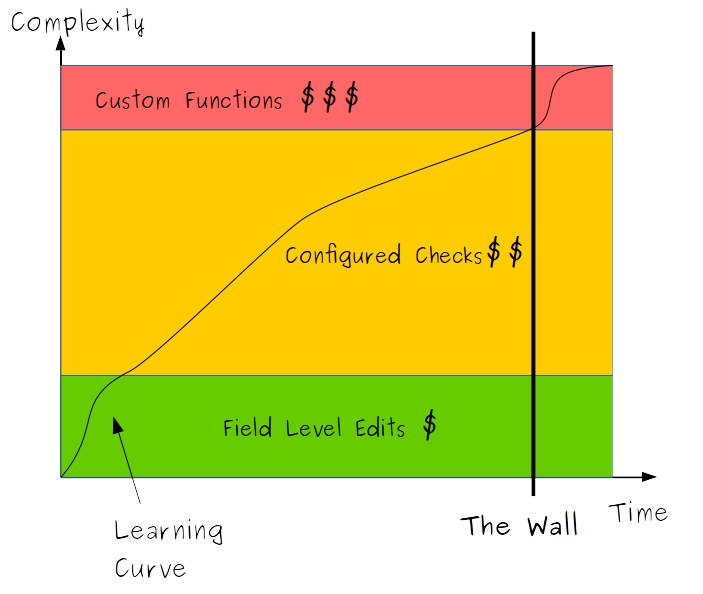
The Wall is moved further away and the learning curve is made much
flatter. This is more than just a nice to have, it means more productive
Study Build staff and reduced costs. Another step on our journey to
reduce the time and effort of Study Build by 50%.
Interested in improving your Rave study build efficiency? Contact us to
find out how TrialGrid can help.
Brick wall image by FWStudio
